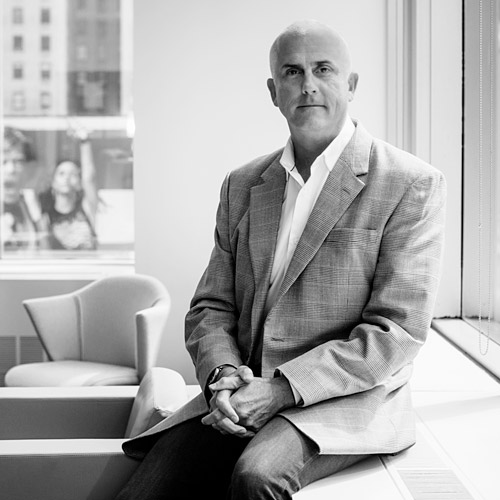Standard Industries—the parent company of GAF, North America’s largest roofing manufacturer—is in the business of keeping the elements—water, wind, snow, ice, and extreme temperatures—outside of buildings. In other words, it fulfills the basic expectation of all roofs since humans ventured outside of caves. However, the roles and construction of roofs are increasingly complex, as are the legal needs of this globally expanding, privately held company.
The Parsippany, New Jersey-based multinational conglomerate’s top lawyer, Jason Pollack, explains that the design, manufacturing, distribution, and installation of the company’s products carry complex risks, but also produce plenty of rewards. That said, in his role as executive vice president of business affairs and general counsel, proactive risk management is an important responsibility for him.
Risk-taking is also emphasized in the conversations Pollack has with new hires in his legal department. “Embrace the risk of making business decisions,” he tells them. “Perfection is not possible. We are here to maximize value, and sometimes, you have to make judgment calls.”
To be clear, these are informed risks and something to which he and the company are well accustomed. GAF’s main business is shingles, membranes, and related materials. Its products, along with Standard Industries’ other businesses, protect buildings from moisture getting in and air getting out, but in fact, roofing is expected to do much more: provide an aesthetic feature on homes and support sustainability efforts, increasingly so for flat commercial roofs.
On another level—one may say 30,000 feet above these roofs—Pollack’s work as an attorney goes far beyond the law and “the business of no” that is often associated with in-house legal departments. He is involved in strategic decision-making that takes place at Standard Industries, both from a legal perspective and that of someone with a deep understanding of the company, its industry, and its markets. Pollack notes that company leadership is incredibly supportive of the legal function, which he attributes in part to the privately held company’s owners, including its late chairman Samuel J. Heyman, who was also an attorney.
Matters of law, mergers, and acquisitions are critical to this sprawling enterprise. GAF has sixty-five manufacturing plants and about 6,500 employees across Europe and North America, with aggregate annual sales that total about $4 billion. Compliance with the various laws applicable to its business and employees is also an integral part of the company’s business strategy and values, which requires the legal department to adapt quickly as they grow when the company grows its footprint.
Pollack played a vital role in the company’s 2016 acquisitions of Icopal, a Denmark-based firm that manufactures roofing and waterproofing membranes, and in its offer to acquire Braas Monier, a roof tile-maker based in Germany. Icopal has eighty-four offices in Europe and North America that largely serve the flat-roof commercial market. Braas Monier—in a deal with Standard Industries pending as of press time—has about 15,000 employees and more than $1 billion in sales, primarily of pitched-roof residential products.
The acquisitions of these companies were about more than transactional documents for the legal department. “We get involved long before that,” Pollack explains. “We talked about the opportunities of this acquisition from day one. We discussed strategies and risks, how to evaluate the companies, and how to fit them into our enterprise.”
Pollack notes that the attorneys need to be aware of key commercial considerations when engaging in the formal legal due diligence process in order to highlight important information that can be useful outside the legal sphere. “We really function as business partners, and this continues after the closing,” Pollack says. “We are involved in the integration of each new business, which includes communications with employees and customers, as well as implementing new business processes.”
The company’s acquisition activities were opportunistic, Pollack says, offering the right opportunity for Standard at the right time. However, they also fit into the company’s strategic vision.
Building materials in general, and roofing in particular, are becoming more focused on sustainability and energy efficiency initiatives. In 2015, GAF bought Quest Construction Products, a leading supplier of roof coatings, which is a growing segment in the marketplace due to its reflectivity and energy efficiency benefits. Quest also offers its StreetBond product line, which is a coating applied to parking lots, playground hardscape, and streetscapes to reflect solar heat gain. These products are valued by architects, construction firms, and building owners that are striving to achieve a LEED v4 certification; roofs and parking areas are now combined in the analysis of this “heat island” factor. They were formerly evaluated as separate parts, which tended to put all green efforts on roofs only. Now, the customer who wants to win on solar reflectivity can cover their roofs and pavement with two different GAF products.
Pollack and his team work closely with sales and marketing to balance the need to highlight the benefits of these products, while at the same time not over-promising and potentially creating unjustified legal obligations for the company. “Our business leaders appreciate the intricacies of legal issues,” Pollack says. “They get it, that sometimes it’s complicated and complex. But we have a culture where legal has their confidence and support. We are part of a team that finds business solutions. This is not a ‘check the box with legal’ culture.”
Pollack explains that this is no accident, as his department operates according to overarching objectives. They observe three core principles. The first is that legal maximizes the value of a deal by recognizing that benefits and risks need to be equally considered. The second is that lawyers understand the key factors of the business so that they can effectively combine legal analysis with business judgment. The last core principle is that attorneys take ownership of the decisions being made in each matter they are involved with in combination with their business partners.
“We do not simply provide our advice and walk away,” Pollack says. “And we do not believe that there are ‘legal issues’ that are separable from ‘business issues.’ Instead, we believe that each participant in a decision-making process brings a different perspective to a discussion and, on many issues, they need to work together to find the right balance so that each person can feel comfortable with, and ultimately take responsibility for, the decisions being made.”
As with any company on a growth-by-acquisitions path, the melding of IT functions is no simple undertaking. Under such circumstances, the opportunities for breaches in cybersecurity naturally increase. While Pollack credits the company’s IT professionals with handling the vast bulk of its defenses, he insists that his own staff must be on guard, as well. “Our team trains our employees to practice care,” he explains. “They have to be sensitive to risks.”
Naturally, the growth of the company has meant expanding the legal department. With a dozen lawyers on staff in the United States and another four in Europe, Pollack looks for people who can adapt to cross-border transactional law and the cultural factors that ultimately play a role in those transactions. “Knowledge can be acquired, such as how the roofing business works,” he says. “But the intelligence and keen judgment to critically analyze new issues and the emotional maturity to work with various groups cannot be taught.”

